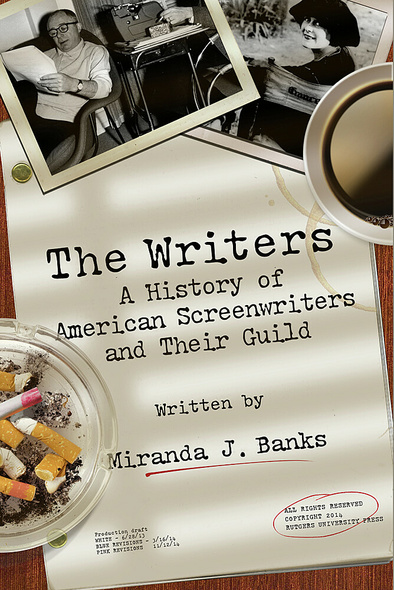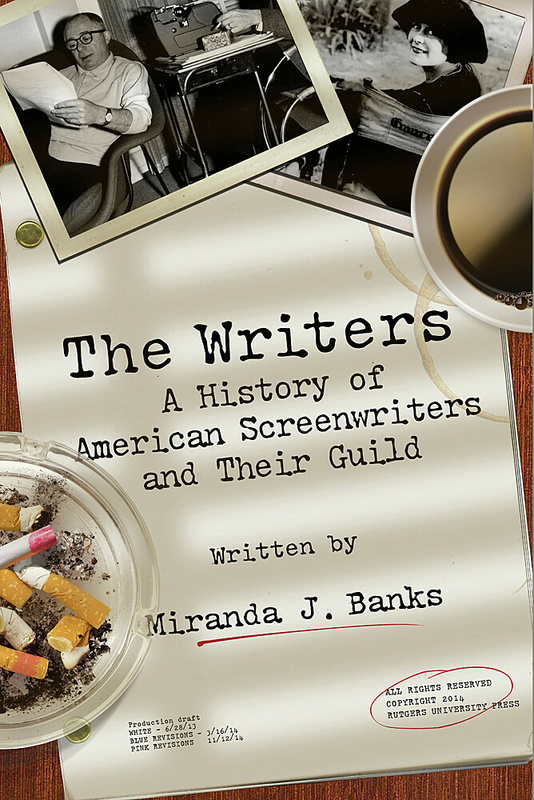
320 pages, 6 1/8 x 9 1/4
25 photographs, 1 table
Paperback
Release Date:01 Sep 2016
ISBN:9780813571393
Hardcover
Release Date:14 Jan 2015
ISBN:9780813571386
The Writers
A History of American Screenwriters and Their Guild
Rutgers University Press
The Writers is the only comprehensive qualitative analysis of the history of writers and writing in the film, television, and streaming media industries in America. Featuring in-depth interviews with over fifty writers—including Mel Brooks, Norman Lear, Carl Reiner, and Frank Pierson—The Writers delivers a compelling, behind-the-scenes look at the role and rights of writers in Hollywood and New York over the past century.
A monumental task—no one has ever tackled anything like this in writing about writers. Well done.
A comprehensive tome that will be appreciated by the film and TV writers who wrote, are still writing, or will someday write.
An original and immensely interesting book, addressing a topic of both scholarly and general interest.
What an important story Miranda Banks tells, and how brilliantly she tells it. The voices of hundreds of writers shine through this history of a neglected but crucial sector of Hollywood production culture. A vital contribution to the field.
A beautifully researched history. Miranda Banks digs deep into the archives to bring out a very powerful, moving--and, at times, gossipy--history of Hollywood and the writers who make it all possible.
Well-informed survey of film and TV writers’ decadeslong battle to defend their economic and creative interests. Banks writes lucidly about complex financial and technical issues, giving a solid, unromantic sense of working writers’ lives.
Banks uncovers the role the Writers Guild of America (WGA) has played in the entertainment industry. With accounts from more than 200 writers and solid access to the Writers Guild Foundation, the book discusses the importance of authorship, name recognition, and membership boundaries. [The Writers] presents a previously lacking exploration of writers and the WGA itself, particularly educating readers on the precedents set for other entertainment guilds. Highly recommended for film buffs and aspiring screenwriters.
[The Writers] is an important contribution to Hollywood history, to studies of the labour movement in the United States, and to explorations of cultural labour. It is an entertaining and compelling story of what is special about artists as workers and what is common to all workers faced with the volatile labour relations of modern neoliberal capitalism.
A monumental task—no one has ever tackled anything like this in writing about writers. Well done.
A comprehensive tome that will be appreciated by the film and TV writers who wrote, are still writing, or will someday write.
An original and immensely interesting book, addressing a topic of both scholarly and general interest.
What an important story Miranda Banks tells, and how brilliantly she tells it. The voices of hundreds of writers shine through this history of a neglected but crucial sector of Hollywood production culture. A vital contribution to the field.
A beautifully researched history. Miranda Banks digs deep into the archives to bring out a very powerful, moving--and, at times, gossipy--history of Hollywood and the writers who make it all possible.
Well-informed survey of film and TV writers’ decadeslong battle to defend their economic and creative interests. Banks writes lucidly about complex financial and technical issues, giving a solid, unromantic sense of working writers’ lives.
Banks uncovers the role the Writers Guild of America (WGA) has played in the entertainment industry. With accounts from more than 200 writers and solid access to the Writers Guild Foundation, the book discusses the importance of authorship, name recognition, and membership boundaries. [The Writers] presents a previously lacking exploration of writers and the WGA itself, particularly educating readers on the precedents set for other entertainment guilds. Highly recommended for film buffs and aspiring screenwriters.
[The Writers] is an important contribution to Hollywood history, to studies of the labour movement in the United States, and to explorations of cultural labour. It is an entertaining and compelling story of what is special about artists as workers and what is common to all workers faced with the volatile labour relations of modern neoliberal capitalism.
MIRANDA J. BANKS is an associate professor of visual and media arts at Emerson College, in Boston, Massachusetts. She is the coeditor of Production Studies Cultural Studies of Media Industries and Production Studies, The Sequel!
Acknowledgments
Introduction
1 The Artist Employee
2 Two Front Lines
3 The Infant Prodigy
4 Mavericks
5 Confederation
Conclusion
Appendix A: Screen Writers and Selected Credits
Appendix B: Methodology
Notes
Bibliography
Index




